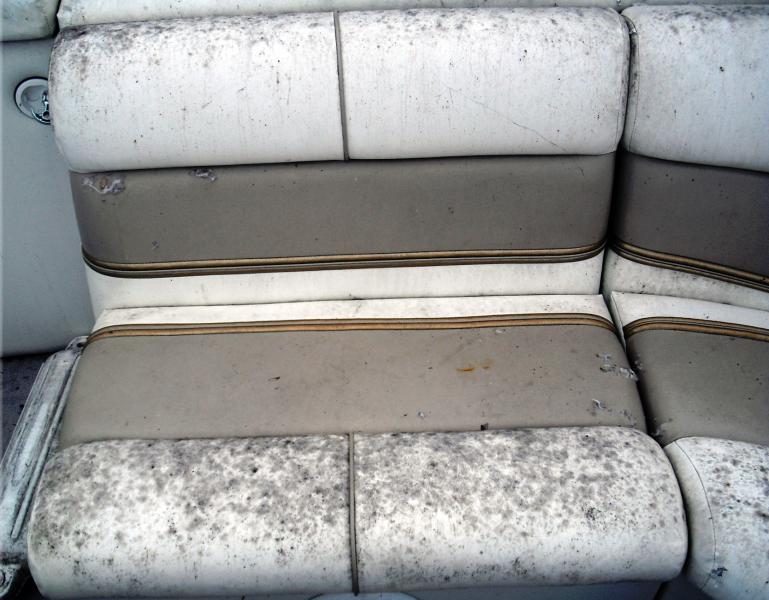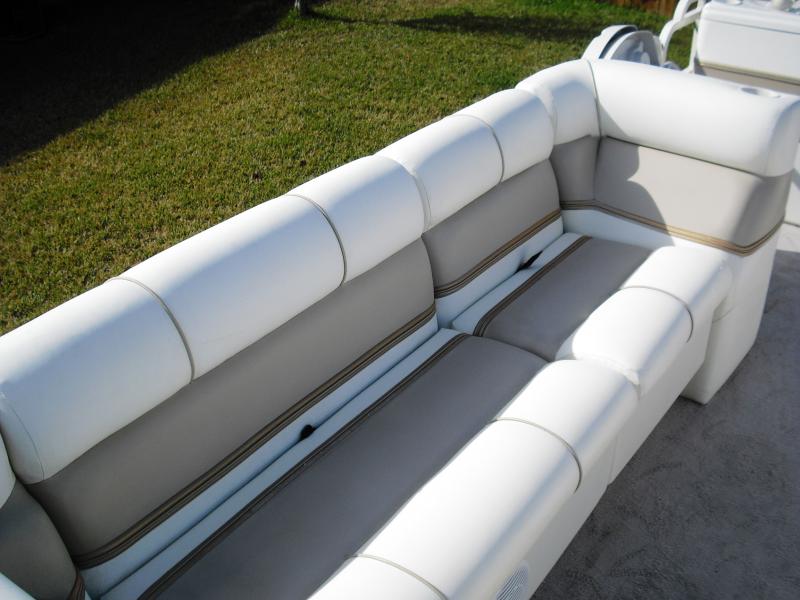How to Clean Mildew Off Your Boat Seats
Clean vinyl boat seats are the best kind of boat seats. But beware of any boat interior’s mortal enemy: mildew. It’s unsightly, dirty, and often grows on seats when boats are covered because it thrives in warm, dark, damp places.
The biggest danger, though, is that mildew can eventually break down the vinyl your seats are made of—and that can cost you money. It’s best to prevent it whenever possible and clean it up quickly once you realize it’s become a problem. Here’s how.

The real danger of mildew on your boat seats
As a boat owner, your watercraft is your pride and joy. So first thing is to try to let it dry out before you cover it. It’s a good idea to let it sit with the storage compartments open to dry well before covering it for extended periods.
When you do cover it, be sure to use a vinyl-protectant spray. You can also throw in a moisture-absorbing material. Buy buckets of commercially produced mildew prevention solutions/mold remover or you can try one of many popular household products. A tin or two of charcoal bricks (not match light!) works well.
Failure to remove mildew from boat seats can cause it to penetrate the vinyl and over time to the point that even a mildew stain remover won’t help. Then the only thing left to do is to re-dye or replace it.

“Before” Mildew. Sad.
Cleaning mildew off boat seats is essential to maintain their appearance and longevity. Mildew can develop on boat seats due to the moisture and humidity in the marine environment. Here’s a detailed step-by-step guide on how to clean mildew off boat seats.
Materials you’ll need
- Rubber gloves
- Safety goggles
- Mildew cleaner
- Bucket
- Soft-bristle brush
- Microfiber cloth (consider a magic eraser sponge, too)
- Vinyl cleaner
- Water hose or access to water
Steps to clean mildew from boat seats
Prevention and mildew cleaning should be a core part of boat maintenance. Here’s how to attack the mold when it shows up:
- Safety Precautions:
- Put on rubber gloves and safety goggles to protect yourself from chemicals and mildew spores.
- Make sure you’re working in a well-ventilated area or outdoors.
- Remove Loose Debris:
- Use a soft-bristle scrub brush or a vacuum cleaner with a brush attachment to remove loose dirt, dust, and debris from the seat cushions. This will prevent scratching the seats during the cleaning process.
- Prepare the Cleaning Solution:
- If you’re using a commercial cleaning product, follow the manufacturer’s instructions for mixing and usage.
- If making a DIY solution, mix one part white vinegar with one part fresh water in a bucket. Alternatively, you can use a mixture of equal parts water and hydrogen peroxide (3% solution).
- You can also add a few drops of dish soap to the mixture to enhance cleaning power for stubborn stains.
- Test a Small Area:
- Before applying the cleaning solution to the entire seat, test it on a small, inconspicuous area to ensure it doesn’t damage or discolor the seat material.
- Apply the Cleaning Solution:
- Dip the soft-bristle brush or a sponge into the cleaning solution.
- Gently scrub the mildewed areas on the boat seats. Use a circular motion, but avoid applying excessive pressure to prevent damaging the upholstery.
- Be patient and thorough, as mildew can be stubborn to remove.
- Allow Dwell Time:
- Let the cleaning solution sit on the mildew stains for a few minutes to allow it to penetrate and loosen the mildew.
- Scrub Again:
- After the dwell time, scrub the mildewed areas once more to lift any remaining mildew stains.
- Rinse Thoroughly:
- Use a water hose or clean water and a sponge to rinse the boat seats thoroughly. Make sure to remove all traces of the cleaning solution.
- Dry the Seats:
- Use a clean, dry microfiber or soft cloth to wipe down and dry the boat seats completely. Proper drying will prevent mildew from returning.
- Prevent Future Mildew Growth:
- To prevent future mildew growth, store your boat in a dry and well-ventilated area when not in use. Consider using mildew-resistant seat covers or treating the seats with a spray to prevent recurring mildew problems.
Regular maintenance and cleaning will help keep your boat seats looking clean and free from mildew. Remember to follow the manufacturer’s recommendations for cleaning and care for your specific boat seat material.
Fibrenew can repair your boat seats no matter how far the mildew menace has come
Fibrenew pros can settle the vinyl boat seat vs. mildew conflict regardless of how extensive it has become. Find your closest Fibrenew operator if your boat needs some TLC today!

“After” Mildew. Happy.
Also, interested in a fresh start in the wonderful world of leather, plastic, and vinyl repair? Always wanted to own your own successful business? Read up and get in touch with us to hear about how becoming a Fibrenew franchisee might be the best thing for you and your boat!
What causes mildew to form on boat seats? Mildew on boat seats is typically caused by moisture, humidity, and lack of proper ventilation in a marine environment. It can develop on various seat materials, including vinyl, fabric, and leather. Can I use bleach to clean mildew off boat seats? While bleach can be effective at removing mildew stains, it’s not recommended for boat seats as it may damage the upholstery and weaken the material over time. It’s safer to use mildew removers specifically designed for marine applications or natural cleaning solutions like vinegar and hydrogen peroxide. How often should I clean my boat seats to prevent mildew? Regular maintenance is key to preventing mildew growth. Depending on your usage and environmental conditions, it’s advisable to clean boat seats at least once a month during the boating season. Additionally, store your boat in a dry, well-ventilated area when not in use to minimize moisture buildup. Can I pressure wash boat seats to remove mildew? Pressure washing can be too harsh for boat seats and may damage the upholstery or force water and mildew spores deeper into the material. It’s better to use a soft-bristle brush and mildew cleaner to gently scrub away mildew. Is it safe to use vinegar to clean boat seats? Yes, a mixture of white vinegar and water is a safe and effective natural cleaner for boat seats. It can help remove mildew stains and odors without causing damage to the upholstery. Just be sure to rinse thoroughly after cleaning. How can I prevent mildew from coming back on my boat seats? To prevent mildew growth, store your boat in a dry and well-ventilated area when not in use. Consider using mildew-resistant seat covers or treating the seats with a mildew-resistant spray. Regularly clean and dry your boat seats after use to remove any moisture. Can I use a fabric softener to prevent mildew on cloth boat seats? Using a fabric softener or a specialized fabric guard designed for marine use can help repel moisture and prevent mildew on cloth boat seats. Follow the product’s instructions for application. Can I use the same cleaning method for all types of boat seat materials? The cleaning method may vary depending on the seat material (vinyl, fabric, leather, etc.). It’s essential to check the manufacturer’s recommendations for cleaning and care specific to your boat seats to avoid damaging the material. What should I do if mildew keeps returning despite cleaning? If mildew keeps coming back, you may need to address underlying moisture issues. Ensure your boat is stored in a dry and well-ventilated space and consider using dehumidifiers or moisture-absorbing products. Additionally, regularly inspect and clean your boat seats to catch mildew early. Are there any commercial products I can use to prevent mildew on boat seats?Cleaning mildew off of boat seats FAQ


